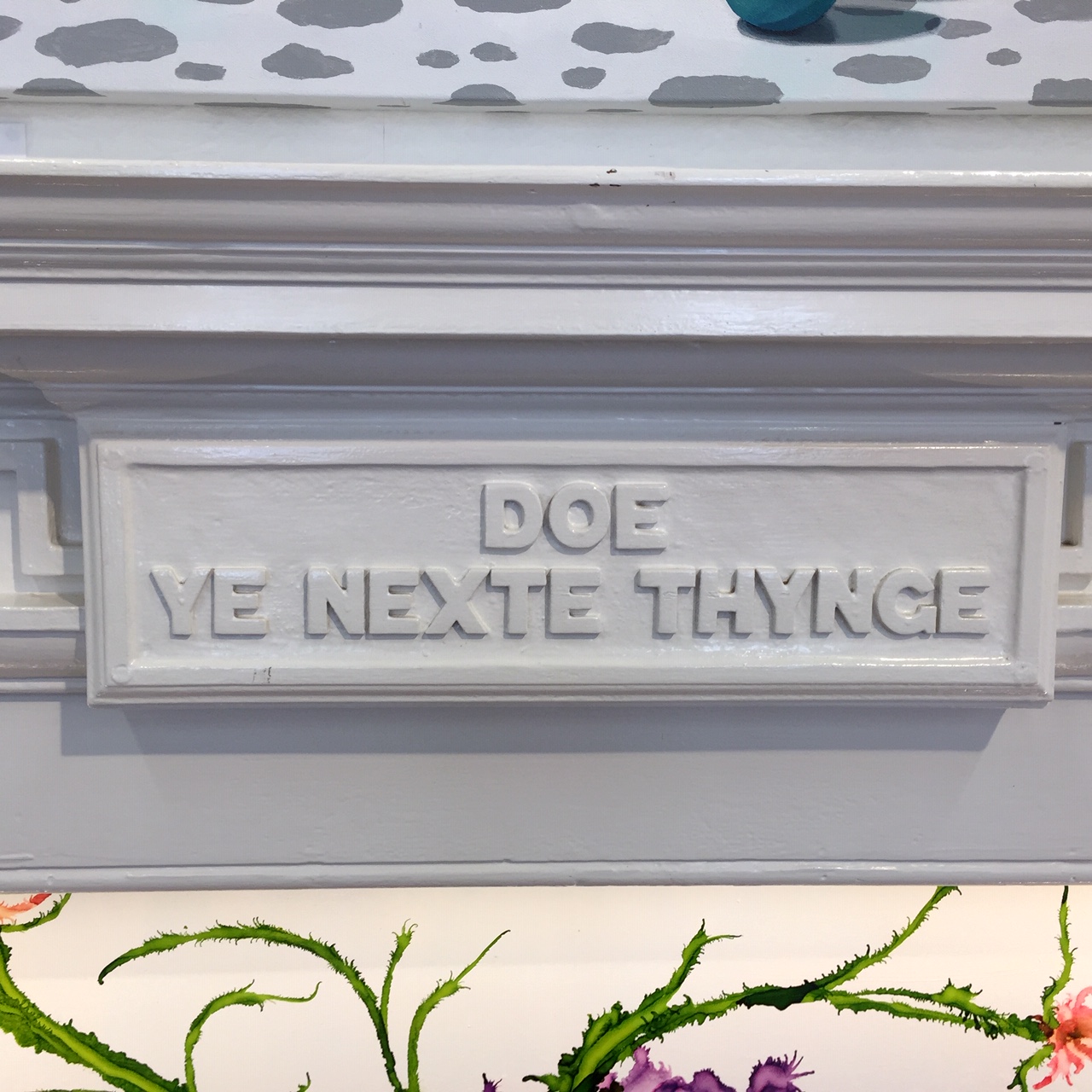Doe Ye Nexte Thynge

I felt compelled to investigate the origin of this inscription over the fireplace of a bedroom in the Swan Hotel, Southwold. I discovered that it was the title of a poem by Minnie E Paull, an American writer, musician and minister’s wife. The poem, first published in 1897, claims the origin to be Saxon.
The phrase became a popular, inspirational motto, adopted by clubs and religious groups, including the Quakers. Opinions are divided as to whether it is intended as inspiration, encouragement or instruction to keep busy and get on with life, whatever challenges you encounter. Had I encountered it earlier, I would have used it as a watchword for Oliver, the main protagonist in my novel Another Life, when dealing with his tribulations.
I learned that Minnie E Paull set her ambitions high; they echo my own, as this quote shows:
‘There is only one thing in this world that can make me happy. I want to be a great writer someday, and that is all I plan for or care about. There is not room in my heart for any other feeling, and ambition is the ruling passion in my life. I cannot imagine letting anything else take its place. Nothing else could satisfy me.’
Here is the full text of the poem:
From an old English parsonage down by the sea
There came in the twilight a message to me;
Its quaint Saxon legend, deeply engraven,
Hath, it seems to me, teaching from Heaven.
And on through the doors the quiet words ring
Like a low inspiration: “Doe ye nexte thynge.”
Many a questioning, many a fear,
Many a doubt, hath its quieting here.
Moment by moment, let down from Heaven,
Time, opportunity, and guidance are given.
Fear not tomorrows, child of the King,
Thrust them with Jesus, doe ye nexte thynge.
Do it immediately, do it with prayer;
Do it reliantly, casting all care;
Do it with reverence, tracing His hand
Who placed it before thee with earnest command.
Stayed on Omnipotence, safe ‘neath His wing,
Leave all results, doe ye nexte thynge
Looking for Jesus, ever serener,
Working or suffering, be thy demeanor;
In His dear presence, the rest of His calm,
The light of His countenance be thy psalm,
Strong in His faithfulness, praise and sing.
Then, as He beckons thee, doe ye nexte thynge.
4 Comments
A reply to this other post that may be of interest:
JohnRobert Peavy says:
June 10, 2015 at 8:35 am
Dear Miz Connell,
The five stanza poem “Doe ye Nexte Thynge” was written by English author, editor and hymnist Emily Elizabeth Steele Elliott (1836-1897), appearing in her collection Stillness and Service (London: Seeley, Jackson & Halliday, circa 1875, 47 pages), a book which is unavailable to me.
The text which I used is from The Sunday School Hive and Juvenile Companion, its Volume XXX, page 167 (London: T. Newton, 119, Salisbury Square, Fleet Street, E.C., 1878), a periodical which Miss Elliott edited for six years.
When she republished her poem in 1880, in At the Beautiful Gate, and Other Religious Poetry, her first line was “From an old English parsonage”, (my 1878 source omits “English”, the original is unavailable to me.
Note: The third stanza, omitted, is:
Oh, He would have thee, daily more free,
Knowing the might of thy royal degree;
Ever in waiting, glad for His call,
Tranquil in chastening, trusting through all.
Comings and goings no turmoil need bring;
His all thy future— “Doe the nexte thynge.”
May God Bless You and Yours,
Robert >
Of course, as soon as I post that I found that it is on p 17-18 of Minnie Paull’s “Christie’s Next Thing” from 1890.
https://play.google.com/books/reader?id=wU5XAAAAYAAJ&pg=GBS.PA22&hl=en
I’m still trying to determine whether she penned it or found it elsewhere.
Thanks, again, for pointing me in the right direction.
You know how internet wandering research can go. . . I’ve been trying to track down the origin of this poem, and I appreciate your help pointing me in the right direction.
I see it quoted in Eleanor Amerman Sutphen’s book “Ye Nexte Thynge” in which (pp. vii-viii) she credits it to Mrs. George A. Paull (Minnie Kenney Paull).
I’m still trying to see whether she picked it up from a periodical or book by Minnie Paull. I’d love to know whether you have found any further info on it.
https://play.google.com/books/reader?id=-OYxAQAAMAAJ&pg=GBS.PA2&hl=en
Hello Alexandra. Unfortunately, life is too short. As a writer, I spend a lot of time down rabbit holes and have to resist taking investigations too far. Thank you for getting in touch.